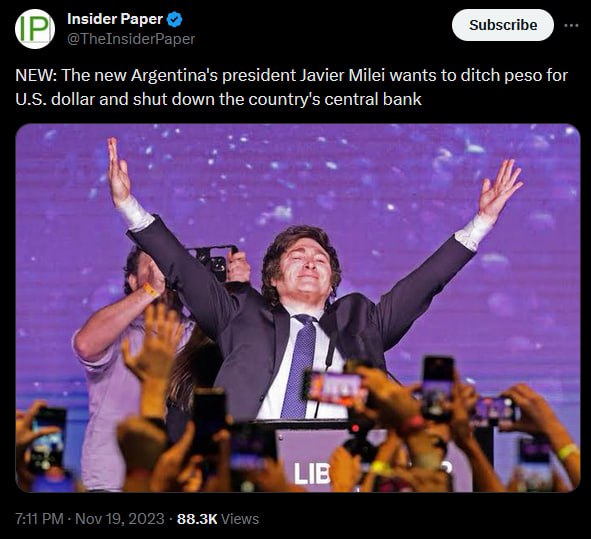Javier Milei, having won the presidential election, has announced a sweeping economic reform plan that includes the end of the Argentine peso through a process of dollarization. This bold move is Milei’s answer to the soaring inflation in Argentina, which had reached 113% at the time of his candidacy. With the peso’s replacement by the US dollar, Milei’s administration anticipates a dramatic halt to inflation within a year following the implementation.
Milei’s dollarization strategy is voluntary, drawing inspiration from El Salvador’s model. Argentinians will have the liberty to transact in both US dollars and pesos during the transition, with complete freedom to move capital. The exchange rate for the peso to the dollar will be set at a rate that reflects the currency’s value on the parallel markets, which are frequently used by Argentinians as a workaround for existing currency controls. Once set, this rate will be frozen, preventing the central bank from further monetary expansion.
As part of the economic overhaul, all foreign exchange restrictions will be lifted, paving the way for a freer, more open economy. This is a critical step for the success of the dollarization process, although it may necessitate some painful adjustments, such as a devaluation and an alignment of utility prices to market levels. These changes are expected to carry social costs, especially considering that around 40% of the country’s population lives below the poverty line.
The restructuring extends to the Argentine central bank, which will no longer hold the nation’s reserves. Instead, a Monetary Stabilization Fund will be established in a foreign jurisdiction such as Switzerland, Ireland, or Luxembourg. This fund will be responsible for settling the central bank’s $26 billion in obligations and managing assets that include government debt.
The fund’s structure is designed to be robust, aiming for an over-collateralization with a ratio of $4 in assets for every $1 of liabilities. The government will also contribute additional assets to ensure the fund’s stability. The fund’s debt instruments, drafted with assistance from the US law firm DLA Piper, will be traded by a consortium of major financial institutions, and it’s projected that the fund’s obligations will be met within four to five years, allowing Argentina to potentially achieve the largest debt cancellation in its history without defaulting.

Argentina ripe for Offshore Investments
In the wake of President Javier Milei’s election victory and his ambitious plan to dollarize Argentina’s economy, the nation is poised to become an attractive destination for offshore investment. The key factors that could make Argentina ripe for such investments include:
Stabilized Currency and Inflation Control: The shift to the US dollar is expected to stabilize the Argentine currency and control the rampant inflation, making the economic environment more predictable for investors. A stable currency reduces the risks associated with exchange rate fluctuations, which can erode returns on investments.
Removal of Exchange Restrictions: The elimination of foreign exchange barriers opens up Argentina’s market to international investors, allowing for free movement of capital. This increased openness is likely to encourage foreign direct investment, as it simplifies the process of repatriating profits and reduces the regulatory burden associated with investments.
Legal and Financial Reforms: The establishment of the Monetary Stabilization Fund, governed by international standards and laws, such as those of New York, adds a layer of security and transparency for offshore investors. It ensures that investments are backed by solid legal frameworks, reducing the risk of arbitrary government intervention.
Opportunity for High Returns: Given the potential for economic recovery and growth post-dollarization, investors may find undervalued assets in Argentina that could yield high returns as the economy improves. This is particularly relevant in sectors that may directly benefit from stabilization and increased consumer confidence.
Boost in Investor Confidence: The government’s commitment to settling central bank obligations and managing debts responsibly is likely to bolster investor confidence. The proposed over-collateralization of the Monetary Stabilization Fund further assures investors of the government’s serious approach to fiscal responsibility.
Regional Integration and Trade Agreements: Argentina’s role in regional trade blocs, such as Mercosur, could become more significant with a dollarized economy, as it may lead to more favorable trade terms and increased economic integration with other countries in the Americas.
However, it is important to note that while these factors may present attractive opportunities, they also come with risks. Investors will have to weigh the potential for economic and social instability during the transition period, as well as the political risks inherent in any major economic overhaul. Therefore, while the outlook for offshore investment in Argentina appears promising, due diligence and a careful assessment of both the opportunities and risks will be essential for investors considering entering the Argentine market.

Leave a Reply